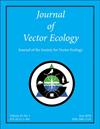肯尼亚登革热流行区和非流行区野生捕获埃及伊蚊种群的生物学特性
IF 1.4
3区 农林科学
Q2 ENTOMOLOGY
引用次数: 0
摘要
病媒性状的变异可以调节病原体传播的局部规模差异。在这里,我们比较了肯尼亚登革热流行区(Kilifi)和非流行区(Isiolo)野生捕获的成年埃及伊蚊种群翅膀长度(代表体型)和能量储备的季节变化。登革热流行地的病媒采样是在旱季和雨季进行的。在非流行地区,仅限于旱季,这是该生态系统的特征,在旱季,一年中零星或无降雨是常见的。我们发现,两性的体型因地点而异,从Isiolo采集的埃及伊蚊种群总体上比从Kilifi采集的小。我们的研究结果表明,尽管在旱季,总碳水化合物和脂质水平在两性中都最高,但男性的水平是女性的两倍。然而,我们发现两性的体型和能量储备之间的相关性较弱,体型在识别群体水平的差异时更敏感。这些结果为肯尼亚登革热流行和非流行生态中埃及伊蚊种群的矢量化潜力的决定因素提供了见解。媒介生态学杂志46(1):19-23。2021年。关键词指数:能量储备、体型、埃及伊蚊、登革热、生态适应。本文章由计算机程序翻译,如有差异,请以英文原文为准。
Biological traits of wild-caught populations of Aedes aegypti in dengue endemic and non-endemic regions of Kenya
Variation in vector traits can modulate local scale differences in pathogen transmission. Here, we compared seasonal variation in the wing length (proxy for body size) and energy reserves of adult wild-caught Aedes aegypti populations from a dengue endemic (Kilifi) and non-endemic (Isiolo) area of Kenya. Vector sampling in the dengue endemic site was conducted during the dry and wet seasons. In the non-endemic area, it was limited to the dry season which characterizes this ecology where sporadic or no rainfall is commonplace during the year. We found variation by site in the body size of both sexes, with an overall smaller size of Ae. aegypti populations collected from Isiolo than those from Kilifi. Our results show that although total carbohydrates and lipids levels were highest in both sexes during the dry season, they were two-fold higher in males than females. However, we found weak correlations between body size and energy reserves for both sexes, with body size being more sensitive in identifying differences at a population level. These results provide insights into the determinants of the vectoring potential of Ae. aegypti populations in dengue endemic and non-endemic ecologies in Kenya. Journal of Vector Ecology 46 (1): 19-23. 2021. Keyword Index: Energy reserves, body size, Aedes aegypti, dengue, ecological adaptation.
求助全文
通过发布文献求助,成功后即可免费获取论文全文。
去求助
来源期刊

Journal of Vector Ecology
生物-昆虫学
CiteScore
2.60
自引率
5.90%
发文量
31
审稿时长
6-12 weeks
期刊介绍:
The Journal of Vector Ecology is an international journal published by the Society for Vector Ecology. It is concerned with all aspects of the biology, ecology, and control of arthropod and vertebrate vectors and the interrelationships between the vectors and the agents of disease that they transmit. The journal publishes original research articles and scientific notes, as well as comprehensive reviews of vector biology based on presentations at Society meetings. All papers are reviewed by at least two qualified scientists who recommend their suitability for publication. Acceptance of manuscripts is based on their scientific merit and is the final decision of the editor, but these decisions may be appealed to the editorial board. The journal began publishing in 1974 and now publishes on-line only.
 求助内容:
求助内容: 应助结果提醒方式:
应助结果提醒方式:


